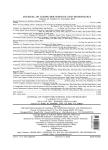版权所有:内蒙古大学图书馆 技术提供:维普资讯• 智图
内蒙古自治区呼和浩特市赛罕区大学西街235号 邮编: 010021

作者机构:Jiangsu Key Laboratory of Big Data Security and Intelligent ProcessingNanjing University of Posts and TelecommunicationsNanjing 210023China
出 版 物:《Journal of Computer Science & Technology》 (计算机科学技术学报(英文版))
年 卷 期:2024年第39卷第6期
页 面:1380-1400页
核心收录:
学科分类:0809[工学-电子科学与技术(可授工学、理学学位)] 08[工学]
基 金:supported by the National Natural Science Foundation of China under Grant Nos.61872193,61872191,and 62072254 the Postgraduate Research and Practice Innovation Program of Jiangsu Province of China under Grant No.KYCX20_0762
主 题:blockchain payment channel network routing mechanism differential privacy personalized privacy-preserving
摘 要:Payment Channel Network(PCN)provides the off-chain settlement of *** is one of the most promising solutions to solve the scalability issue of the *** routing techniques in PCN have been ***,both incentive attack and privacy protection have not been considered in existing *** this paper,we present an auction-based system model for PCN routing using the Laplace differential privacy *** formulate the cost optimization problem to minimize the path cost under the constraints of the Hashed Time-Lock Contract(HTLC)tolerance and the channel *** propose an approximation algorithm to find the top K shortest paths constrained by the HTLC tolerance and the channel capacity,i.e.,top K-restricted shortest ***,we design the probability comparison function to find the path with the largest probability of having the lowest path cost among the top K-restricted shortest paths as the final ***,we apply the binary search to calculate the transaction fee of each *** both theoretical analysis and extensive simulations,we demonstrate that the proposed routing mechanism can guarantee the truthfulness and individual rationality with the probabilities of 1/2 and 1/4,*** can also ensure the differential privacy of the *** experiments on the real-world datasets demonstrate that the privacy leakage of the proposed mechanism is 73.21%lower than that of the unified privacy protection mechanism with only 13.2%more path cost compared with the algorithm without privacy protection on average.